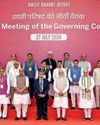
ON FEBRUARY 8, social worker Mauris Noronha shot dead former Shiv Sena (UBT) corporator Abhishek Ghosalkar during a Facebook Live session. The murder, and the viral video of the crime, sent shockwaves across Maharashtra.
The opposition alleged that law and order in the state had collapsed. It flayed the state government led by Chief Minister Eknath Shinde, and demanded the resignation of Devendra Fadnavis, Shinde’s deputy and home minister. Fadnavis said Noronha had shot Ghosalkar, and then killed himself, because of personal rivalry. Noronha apparently believed that Ghosalkar was behind a rape case filed against him, and that he was trying to sabotage his political plans. “The opposition can demand anything,” said Fadnavis. “Even if a car runs over a dog tomorrow, they would ask the home minister to resign.”
Another violent incident had stunned the state just a few days before the Ghosalkar killing. BJP legislator Ganpat Gaikwad was arrested for allegedly firing at Mahesh Gaikwad, a former corporator of the Shinde-led Shiv Sena, at a police station in Thane district. The firing allegedly happened in the chamber of the police inspector at Ulhasnagar. Mahesh is in hospital fighting for his life.
Ganpat told journalists that he felt no remorse. “The chief minister has the state under goonda raj (mob rule),” he said. A three-time legislator whose own record is dubious, Gaikwad is a known rival of Shinde’s Sena in Thane district.
Political leaders courting criminals is an old phenomenon. In fact, the Shiv Sena-BJP alliance had first come to power in Maharashtra in 1995 after a sustained campaign against former chief minister Sharad Pawar’s alleged criminalisation of politics in the 1990s. So, what has changed in the past three decades?
This story is from the February 25, 2024 edition of THE WEEK India.
Start your 7-day Magzter GOLD free trial to access thousands of curated premium stories, and 9,000+ magazines and newspapers.
Already a subscriber ? Sign In
This story is from the February 25, 2024 edition of THE WEEK India.
Start your 7-day Magzter GOLD free trial to access thousands of curated premium stories, and 9,000+ magazines and newspapers.
Already a subscriber? Sign In

Doctor's doctors
Internists deal with prevention, diagnosis and treatment of all kinds of diseases, while also coordinating with doctors across specialties

WORK THIS OUT!
What is the true cost of a 90-hour workweek? Reduced productivity, mental health issues and severe health risks, say doctors

The experience of oppression
The British enacted several laws that might appear liberal, only to then veto the invocation of progressive measures. Nevertheless, these milestones guided the founding fathers in conceiving and creating the Constitution of India

One, two, buckle my shoe!
“Darling,” I said to my life companion of more years than I care to remember, “Do you think there is any correlation between pain in the feet and attending prayer meetings?”“You really are a stupid old man!” said the light of my life. “Can’t you think of anything more bizarre so late at night?”

A helping hand
Over the past year, Imaginarium has placed 3D-printed parts in space, in human bodies, in oil fields in the Middle East, and as drones on the Indian border

Fading federalism
One of the most visible indicators of the erosion of state autonomy is the diminishing financial independence of states

FOUNDING MOTHERS OF THE CONSTITUTION
THEIR CONTRIBUTION IN THE MAKING OF THE REPUBLIC REMAINS EXEMPLARY AND INSPIRING

Value every breath
VO2 max is the best way to measure fitness and predict life expectancy

Statutes of unity
The Constitution reminds us that national oneness comes through addressing inequalities, not enforcing uniformity

Incomplete equality
Equal marriage rights is one of the last bastions of patriarchy and to dismantle it, the recognition of marital rape as an offence is non-negotiable